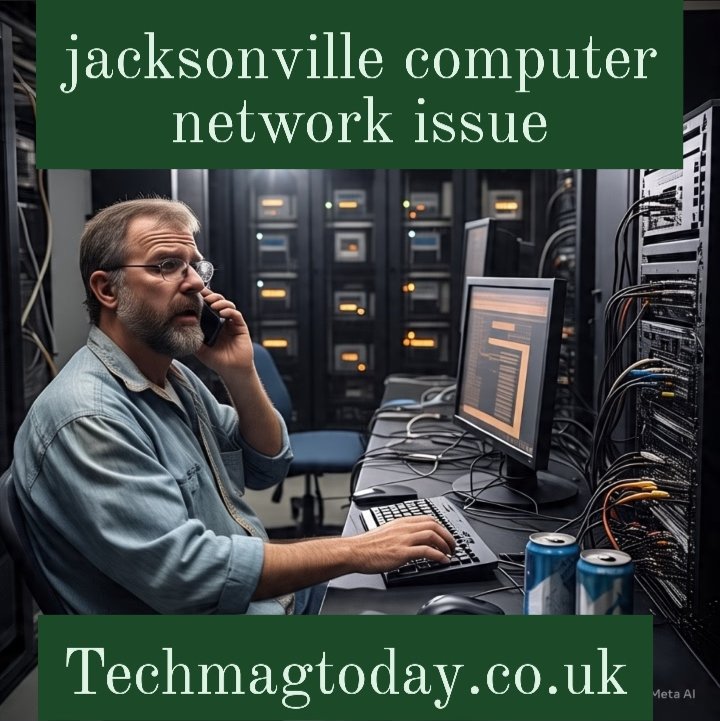
Hook:
Jacksonville businesses and residents are facing a growing challenge that could disrupt everything from day-to-day operations to digital communication—persistent computer network issues. Whether you’re a small business owner in Riverside or a professional working remotely from San Marco, network instability is no longer just frustrating—it’s becoming a serious concern. But what’s really behind the Jacksonville computer network issue, and how can it be addressed effectively?
📌 Key Highlights of the Article
- Understand the root causes of Jacksonville’s recurring computer network issues.
- Explore how local infrastructure, weather, and cyber threats contribute to the problem.
- Discover the impact on businesses, healthcare, education, and remote work.
- Learn actionable solutions for preventing and resolving network problems.
- Stay informed with FAQs about Jacksonville’s network problems.
A Growing Digital Dilemma in Jacksonville
Jacksonville, Florida—known for its sprawling urban layout and tech-savvy population—is facing a new age dilemma. Increasingly, residents and businesses are reporting disruptions in computer networks, slow internet connectivity, and system-wide failures. The complaints aren’t isolated or random; they’re widespread and rising steadily. Whether it’s a dropped Zoom call during an important meeting or interrupted payment processing at retail stores, the frustration is real. And the issue is no longer limited to one provider, making the problem more complex than simply switching ISPs.
This isn’t just a minor inconvenience—it’s a digital bottleneck affecting productivity, connectivity, and security across sectors. While some shrug it off as routine technical trouble, those closely monitoring Jacksonville’s tech environment know this is something bigger.
The Real Causes Behind the Network Glitch
Contrary to popular belief, the Jacksonville computer network issue isn’t just about a bad router or outdated hardware. The problem is systemic. Several factors are contributing to this city-wide connectivity breakdown. First, there’s the aging digital infrastructure. Jacksonville’s rapid urban development has not been matched with equivalent upgrades to its fiber-optic and broadband systems.
Second, unpredictable weather patterns, including thunderstorms and hurricanes, have repeatedly damaged underground cables and server nodes. Add to that the increased demand for bandwidth post-pandemic as more residents shifted to remote work and online education.
Finally, cyberattacks and data breaches have placed tremendous pressure on IT systems, forcing service providers to implement aggressive firewalls and traffic-shaping tactics that sometimes backfire, resulting in throttled connections.
How Businesses Are Being Affected
Businesses are among the worst hit. In downtown Jacksonville and commercial hubs like Southside and Baymeadows, companies have reported everything from server crashes to data transfer delays. Industries such as logistics, healthcare, and finance, which depend heavily on seamless computer networks, are facing a serious operational dilemma.
Imagine a hospital’s appointment system crashing or a logistics company unable to track its fleet in real-time—these are not hypothetical situations but ongoing occurrences. Business owners say the inconsistency in service is costing them time, money, and customer trust.
Moreover, the situation is giving rise to expensive alternatives like dedicated leased lines, which are not feasible for small or medium enterprises. It’s becoming clear that unless the root problems are addressed, Jacksonville’s commercial competitiveness could take a nosedive.
Impact on Education and Online Learnin
With more schools adopting digital classrooms and remote learning tools, a stable computer network is no longer optional—it’s essential. Students across Jacksonville have found themselves logged out of live sessions, unable to upload assignments, or forced to retake tests due to disconnections.
Teachers too are struggling to maintain class continuity. The problem isn’t just technological—it’s educational. Unequal access to reliable networks is widening the academic gap between students in well-connected neighborhoods and those in underserved areas.
Educators and school administrators are now urging local officials to invest in smart infrastructure and backup connectivity plans. Without systemic intervention, Jacksonville’s students could be at a disadvantage in a world increasingly driven by digital literacy.
Cybersecurity Concerns Amid Network Failures
When networks falter, security vulnerabilities increase. Jacksonville’s network issues have opened doors for malicious attacks. From phishing attempts to ransomware, many local businesses and even municipal offices have reported breaches. A slow or unstable network often lacks the capacity to run real-time antivirus and intrusion detection systems, making systems more susceptible.
Experts believe cybercriminals are actively exploiting known network weaknesses in the region. The combination of outdated software, poor encryption standards, and irregular updates creates an easy target for hackers.
Companies are now hiring cybersecurity consultants not only to defend their data but also to audit their network structures and recommend proactive changes. This added layer of cost and complexity is yet another burden in an already tense digital environment.
The Role of Internet Service Providers (ISPs)
You might expect ISPs to be leading the charge in fixing these problems, but the response has been mixed at best. While some providers in Jacksonville have upgraded their networks and promised faster speeds, the reality on the ground paints a different picture.
Frequent complaints of customer service delays, vague explanations, and inconsistent service suggest that ISPs are either overwhelmed or underprepared. Even after service calls and technician visits, many residents continue to face spotty internet.
Regulatory pressure might be needed to compel these companies to invest more seriously in Jacksonville’s digital backbone. For now, community forums and social media are filled with frustrated voices demanding accountability
Solutions That Actually Work
So, what can be done about it? For starters, routine audits of network systems at both residential and commercial levels can identify the weak links. Businesses should consider cloud-based backup systems and redundant connectivity options, such as dual ISPs or wireless failovers.
On the municipal level, there’s a strong case for public-private partnerships to fund infrastructure overhauls. Cities like Chattanooga, TN, and Kansas City, MO, have shown that city-wide fiber-optic networks are not just possible but profitable in the long run.
For homeowners and remote workers, upgrading modems and routers, ensuring firmware is current, and using mesh networks for better coverage are practical steps. However, all these measures must be underpinned by robust service support from ISPs.
Why Jacksonville Can’t Afford to Ignore This
If left unchecked, the Jacksonville computer network issue could become a major economic and social liability. Businesses may relocate, jobs could be lost, and public services like healthcare and education may continue to suffer. The city’s aspirations of becoming a tech-forward urban hub will be compromised if network stability isn’t prioritized.
Moreover, in an age where remote work and digital operations are becoming the norm, any delay in network reform will set Jacksonville behind more proactive cities. This isn’t just about internet speed—it’s about staying relevant in the modern economy.
Voices from the Community
To understand the magnitude of this issue, one only needs to listen to Jacksonville’s residents. A software developer in Arlington reported losing a lucrative client due to repeated call drops during virtual meetings. A teacher in Mandarin shared how her students missed an entire lesson because her school’s system failed. Even small business owners from Springfield to Ortega have echoed similar frustrations.
These real-life stories underline the urgency of the situation. People are not just annoyed—they’re being directly affected in ways that impact their income, education, and mental well-being.
The Future of Jacksonville’s Digital Infrastructure
The good news is that solutions do exist, and many of them are being discussed in local policy meetings. There is talk of bringing 5G expansion to more parts of the city, investing in municipal broadband, and offering grants to small businesses for IT upgrades.
City leaders need to listen, act, and deliver. Jacksonville has the opportunity to become a beacon of digital resilience—but only if immediate action is taken. The future depends on how seriously this issue is prioritized today.
Final Thoughts: It’s Time to Act
The Jacksonville computer network issue is not just a technical glitch—it’s a growing crisis with widespread implications. From hampering daily productivity to posing serious cybersecurity risks, the consequences are far-reaching. The situation demands urgency, collaboration, and above all, accountability.
Jacksonville must treat this digital challenge with the same seriousness as it would any major infrastructure concern. Just as roads and bridges need maintenance and upgrades, so too does the invisible highway of information that powers our modern lives.
Conclusion
Jacksonville’s computer network issues are a clear warning that digital infrastructure can no longer be treated as an afterthought. Whether you’re running a business, attending online classes, or simply streaming content at home, stable connectivity is now a basic necessity. Solving this crisis requires a joint effort from local government, service providers, businesses, and the community. The longer we wait, the higher the cost—in dollars, time, and trust.
Frequently Asked Questions (FAQs)
Q1: What’s causing the Jacksonville computer network issues?
The problems stem from a combination of outdated infrastructure, increased data demand, unpredictable weather, and a rise in cybersecurity threats.
Q2: How are businesses dealing with network failures?
Many are investing in redundant systems, hiring cybersecurity professionals, and pushing ISPs for more reliable service.
Q3: Can these issues be fixed in the short term?
Short-term solutions like better hardware, mesh networks, and improved ISP support can help, but long-term relief requires city-wide infrastructure investments.



